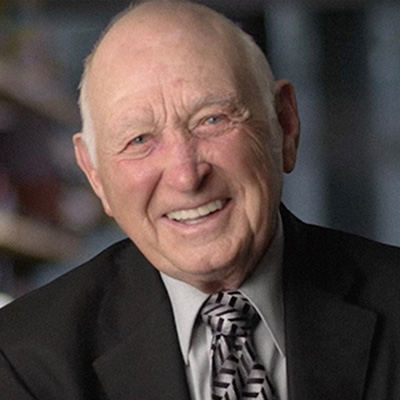In memoriam: Gerold Grodsky
Gerold Grodsky, a retired professor of biochemistry, biophysics and medicine at the University of California, San Francisco, died Dec. 29, 2022 in San Francisco. He was 95, and he had been a member of the American Society for Biochemistry and Molecular Biology since 1961.

A native of St. Louis, Missouri, Grodsky was born Jan. 18, 1927. His father ran a soft-drink bottling business, which, according to a family obituary, sparked Grodsky’s early interest in chemistry.
At 17, he headed for the University of Illinois where he joined naval officer training. He graduated summa cum laude in chemistry as a Navy ensign and also earned a master's degree at the U of I. He received his Ph.D. in biochemistry at the University of California, Berkeley, where he met Kayla Deane Wolfe. They married and were together for 50 years until her death in 2003.
As a postdoctoral fellow at Cambridge University, Grodsky grew interested in diabetes research. He studied bilirubin metabolism for two years as a researcher at the University of California, San Francisco, and then joined the school’s metabolic unit, later known as the UCSF Diabetes Center. There, he pivoted to the study of insulin.
In the 1960s, Grodsky developed the first precipitating radio immunoassay for insulin, which enabled accurate measurement of insulin in biological fluids and tissues. His studies pioneered description of the fast and slow phases of insulin release and the hypothesis that insulin is stored in compartments of differing availability. His work on rapid insulin release helped inform algorithms for the artificial pancreas, faster-acting beta-cell stimulants, and fast-absorbing insulin preparations.
Grodsky was founding editor of two diabetes journals. He received the Rumbough Science Award from the Juvenile Diabetes Research Foundation, the Paul Lacy Memorial Lecture Award from the International Pancreas and Islet Transplant Association and UCSF's Lifetime Achievement Award. In 1993, the Juvenile Diabetes Research Foundation established the Gerold and Kayla Grodsky Basic Research Scientist Award. In 2010, UCSF created the Gerold Grodsky, Ph.D. Chair in Diabetes Research.
Grodsky retired in 1990 but continued consulting at the UCSF Diabetes Center. He had a host of hobbies; he collected antique black powder rifles and enjoyed sailing, tennis and fishing trips with family.
Grodsky’s daughter Jamie died in 2010. He is survived by his companion, Roberta Sherman; daughter Andrea Huber and her husband; four grandchildren; and two great-grandchildren.
Enjoy reading ASBMB Today?
Become a member to receive the print edition four times a year and the digital edition monthly.
Learn moreGet the latest from ASBMB Today
Enter your email address, and we’ll send you a weekly email with recent articles, interviews and more.
Latest in People
People highlights or most popular articles

Building a career in nutrition across continents
Driven by past women in science, Kazi Sarjana Safain left Bangladesh and pursued a scientific career in the U.S.

Kiessling wins glycobiology award
She was honored by the Society for Glycobiology for her work on protein–glycan interactions.

2026 ASBMB election results
Meet the new Council members and Nominating Committee member.

Simcox wins SACNAS mentorship award
She was recognized for her sustained excellence in mentorship and was honored at SACNAS’ 2025 National Conference.

From humble beginnings to unlocking lysosomal secrets
Monther Abu–Remaileh will receive the ASBMB’s 2026 Walter A. Shaw Young Investigator Award in Lipid Research at the ASBMB Annual Meeting, March 7-10 in Washington, D.C.

Chemistry meets biology to thwart parasites
Margaret Phillips will receive the Alice and C. C. Wang Award in Molecular Parasitology at the ASBMB Annual Meeting, March 7-10 in Washington, D.C.
